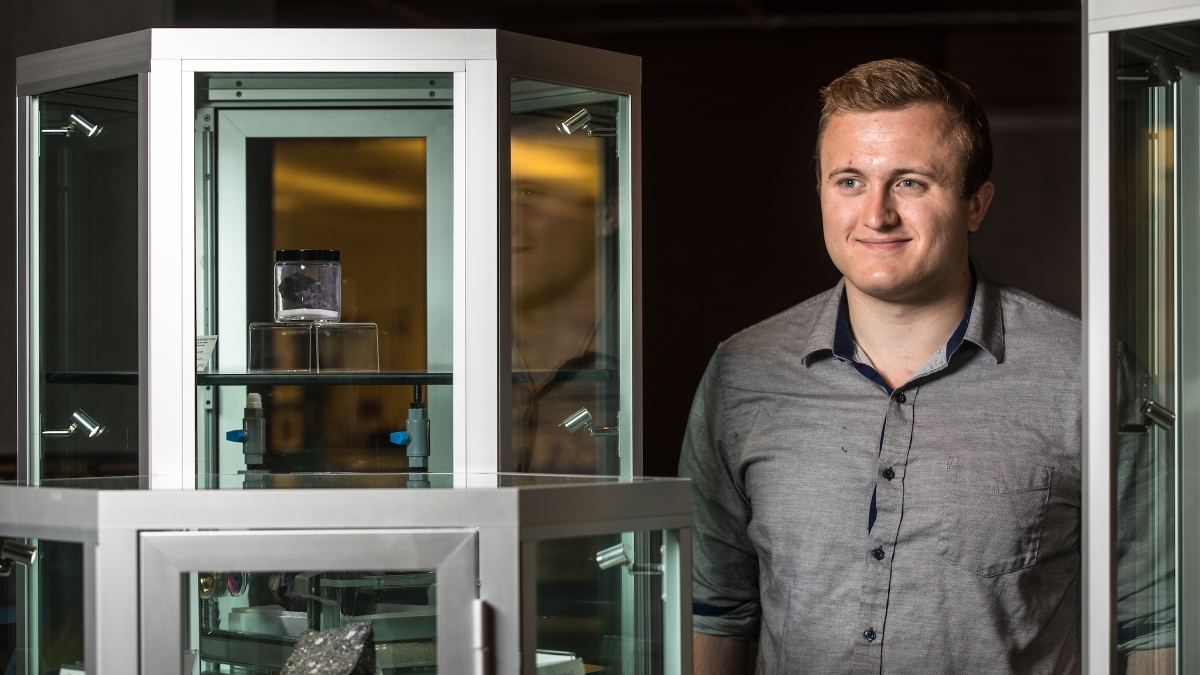Editor’s note: This is part of a series of profiles for spring 2017 commencement. See more graduates here.
When the Apollo astronauts trained in Arizona, Ron Greeley, one of the founders of planetary geology and the father of Arizona State University’s space program, helped educate them about geology.
Early astronauts tended to be fighter jocks who weren’t terribly interested in rocks. Greeley succeeded in educating them to be more sophisticated than describing rocks as big or little, and how to differentiate between an interesting rock and a more prosaic sample.
Arizona State University student Garrett Fleetwood, about to graduate with a degree in mechanical engineering from the School for Engineering of Matter, Transport & Energy in the Ira A. Fulton Schools of Engineering and another degree in economics, wrote an undergraduate thesis tackling that exact problem.
The Corvallis, Oregon, native invented a computerized process to identify rock samples and put them into categories. His approach can learn from human experts and extrapolate their decision processes to identify interesting rock samples.
The thesis — “A Concept for Using Superformula and Information Theory to Identify and Prioritize Interesting Objects in Autonomous Exploration” — may someday help create a geologic scanning instrument used in space exploration.
Q: What was your “aha” moment, when you realized you wanted to study the field you majored in?
A: I’ve always known I was destined for engineering. I was the sci-fi nerd: "Let’s make this happen." ... The thing that really gets me is the idea of establishing a permanent base on the moon or Mars. That’s just something I’ve always wanted to see happen. I can help.
Q: What’s something you learned while at ASU — in the classroom or otherwise — that surprised you, that changed your perspective?
A: One of the fun things you learn about engineering and the sciences in general is that the more you know, the less you know. You realize that really quickly.
Q: Why did you choose ASU?
A: It was the scholarship.
Q: What was your favorite spot on campus, whether for studying, meeting friends or just thinking about life?
A: College Avenue Commons. It’s a really nice building.
Q: What are your plans after graduation?
A: Grad school.
Q: If someone gave you $40 million to solve one problem on our planet, what would you tackle?
A: There’s so much to choose from. And that’s really not a lot of money. It used to be. I’m going to go generic and say world hunger. You could probably make a dent with a distribution center or something.
More Science and technology

ASU at the heart of the state's revitalized microelectronics industry
A stronger local economy, more reliable technology, and a future where our computers and devices do the impossible: that’s the transformation ASU is driving through its microelectronics research…

Breakthrough copper alloy achieves unprecedented high-temperature performance
A team of researchers from Arizona State University, the U.S. Army Research Laboratory, Lehigh University and Louisiana State University has developed a groundbreaking high-temperature copper alloy…

4 ASU researchers named senior members of the National Academy of Inventors
The National Academy of Inventors recently named four Arizona State University researchers as senior members to the prestigious organization.Professor Qiang Chen and associate professors Matthew…


